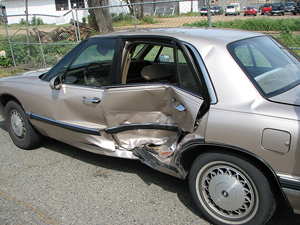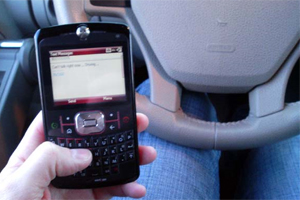Posts Tagged ‘attorney’
Product Liability: Magnet Desk Toy is Children’s Choking Hazard
 The Consumer Product Safety Commission (CPSC) has taken a rare legal action seeking to stop sales of a magnet desk toy, alleging children are swallowing the pieces, then suffering serious injuries requiring surgery.
The Consumer Product Safety Commission (CPSC) has taken a rare legal action seeking to stop sales of a magnet desk toy, alleging children are swallowing the pieces, then suffering serious injuries requiring surgery.
The CPSC filed an administrative complaint on July 25 against Maxfield & Oberton Holdings LLC, of New York, N.Y., the maker of Buckyballs and Buckycubes. The government agency and company failed to agree on the CPSC’s proposed voluntary recall plan for the magnet sets with 216 units.
The CPSC alleges the popular desk furnishing contains a defect in design, packaging, warnings and instructions. It wants the company to stop selling the defective product, notify the public about potential for injury and offer consumers a full refund. It is the CPSC’s second time taking this type of legal action in 11 years.
The CPSC is intervening after receiving more than two dozen of reports young children and teenagers have swallowed the magnets, requiring surgery. At least a dozen involved Buckyballs.
When two or more magnets are swallowed, they can move toward each other through the stomach and intestinal walls, resulting in serious injuries such as holes in the stomach, intestinal blockage, blood poisoning and possible wrongful death.
The CPSC reports young children are removing the magnets from the kits and placing them in their mouth. Meanwhile, older children and teenagers have unintentionally swallowed the magnets while placing them in their mouths to mimic having a tongue ring.
At least 10 retailers, including Amazon.com, have agreed to stop selling the defective product. EBay is also removing these listings from its online marketplace.
In May 2010, the CPSC and Max & Oberton conducted a cooperative recall of about 175,000 Buckyball magnet sets for mislabeling. The toys were labeled “Ages 13+” and did not meet the federal toy standard that loose magnets not be sold for children younger than 14. Injury reports preceded and followed the notice.
In November 2011, the CPSC and Max & Oberton worked cooperatively to warn about the dangers that could occur, but injuries continued, leading to the CPSC’s latest action. The CPSC now says a recall is necessary because all these prior steps have been ineffective.
Related:
- CPSC Sues Maxfield & Oberton Over Hazardous Buckyballs and Buckycube Desk Toys, Consumer Product Safety Commission.
- Feds file suit against Buckyballs, retailers ban product, USA Today.
Boston’s Hubway Bike Share Expanding into Cambridge
 Boston’s Hubway bike share program is about to push beyond city limits, with an expansion over the Charles River into Cambridge and other communities starting as early as this week.
Boston’s Hubway bike share program is about to push beyond city limits, with an expansion over the Charles River into Cambridge and other communities starting as early as this week.
The Boston Globe reports the first of 24 new bike kiosks may start arriving in Cambridge this week and should operational by the second week in August. Somerville is slated to receive 12 stations with four planned in Brookline. The city of Boston launched the program in the summer of 2011. It now has 600 bikes for 61 stations and will add 11 new stations. With the expansion, the Boston region will have more than 1,000 public bikes available, The Boston Herald reported.
In Cambridge and Somerville, bike stations will be added at major squares and areas in between. In Brookline, new stations are coming to Coolidge Corner, Town Hall and the Brookline Village MBTA stop.
In Boston, new stations will be placed in Allston, Charlestown, Dorchester and Roxbury. Next year, Hubway may expand into Jamaica Plain, as well as Newton and Arlington, officials told The Boston Herald.
The expansion comes after a first year in which Hubway exceeded all expectations. It has seen twice as many trips and paid subscribers as planned. Over 360,000 individual bike trips have been taken since its start and this summer, tourists and commuters are taking about 2,000 bike trips per day.
The program is operated by Alta Bicycle Share in partnership with Boston Bikes, an initiative of the City of Boston. It is partially funded by the Federal Transit Administration. Outside Boston, each community and Alta Bicycle Share work together on securing grants and sponsorships to fund each bike station, which can cost $50,000.
The program offers Annual Membership for three seasons, which can be purchased online for $85. These members receive a key to unlock bikes for use. Rides under 30 minutes are covered under the membership fee; longer rides incur additional fees. Others can purchase short-term Access Passes for 24 hours or three days.
The Hubway reported few bike accidents resulting in injury during its first year. The program reported no bike accidents requiring ambulance response and only two bike accidents overall. The program’s contract requires riders to wear helmets to protect themselves in bike accidents. It encourages this by making helmets available for purchase when you buy a membership. It also has a network of retailers throughout the city who offer discounted memberships.
Related:
- Hubway, turning 1, is about to expand, The Boston Globe.
- Hubway expansion to bring another 400 bikes to roads, The Boston Herald.
- The Hubway.
- What to know about cycling in Boston, Breakstone, White & Gluck.
Drownings Claim 90 Children in U.S. Since Memorial Day
 The Consumer Product Safety Commission (CPSC) reports pool drownings have claimed the lives of 90 children in the U.S. since Memorial Day, a sober reminder for parents and caregivers to review how they are protecting their youth.
The Consumer Product Safety Commission (CPSC) reports pool drownings have claimed the lives of 90 children in the U.S. since Memorial Day, a sober reminder for parents and caregivers to review how they are protecting their youth.
These figures were released for Pool Safely Day, an event being observed nationwide this week, from July 22 to July 29, 2012. In Massachusetts, the South Shore YMCA in Quincy and the Boys & Girls Club of Taunton were scheduled to host educational events.
The CPSC reported 90 children under age 15 have suffered swimming pool drownings and an additional 106 children in the same age category have required emergency response for near-drowning incidents at pools. The figures were released by the CPSC’s Pool Safely: Simple Steps Save Lives campaign.
The figures show younger children are most vulnerable, with 72 percent of the drowning victims younger than 5 years old.
Texas saw 13 drownings, the highest number nationwide through the mid-summer report, with California, New York, North Carolina, Ohio and Pennsylvania each reporting 5 swimming pool drownings.
Parents should make sure their children have taken swimming lessons and instruct them on ways to protect themselves, such as to stay away from pool drains, pipes and other openings; stay in certain areas of the pool and only use diving boards after asking parents. Children 13 and older should also be trained in CPR.
Parents and caregivers should also:
- Stay close and alert when watching children in and around the pool.
- Never leave children unattended.
- Learn CPR.
- If you own a pool or spa, make sure it has appropriate safety equipment. At pools, that includes fencing, a lockable safety cover, drain covers which match federal requirements, life rings and a reaching pool. Spas should have lockable covers for when not in use.
Click here for a full list of pool safety tips from the Boston personal injury lawyers at Breakstone, White & Gluck of Massachusetts.
Related:
- Midsummer Drowning Checkup: 90 Child Drownings Nationwide since Memorial Day, Consumer Product Safety Commission.
- Swimming Pool Accidents, Breakstone, White & Gluck.
- Pool Safely website.
- Virginia Graeme Baker Pool & Spa Safety Act, Pool Safely.
Propane Explosion Victim’s Family Settles for $7.5 Million in Norfolk Case
 Attorney Marc L. Breakstone of Breakstone, White & Gluck in Boston has announced a $7.5 million settlement has been reached for an electrician killed in a propane gas explosion at a Norfolk, Massachusetts condominium complex.
Attorney Marc L. Breakstone of Breakstone, White & Gluck in Boston has announced a $7.5 million settlement has been reached for an electrician killed in a propane gas explosion at a Norfolk, Massachusetts condominium complex.
Breakstone and the family of William “Billy” Nichols announced the settlement on July 9, nearly two years after Nichols died in the July 30, 2010 propane explosion. Breakstone represented the Nichols family and filed a wrongful death lawsuit on their behalf against EnergyUSA Propane and Smolinsky Brothers Heating and Plumbing.
The wrongful death lawsuit alleged EnergyUSA negligently underfilled a new propane tank at the complex where Nichols had been working. By underfilling the tank, the company caused the chemical odorant to fade, making propane undetectable when it started to leak.
The wrongful death lawsuit alleged Smolinsky Brothers Heating and Plumbing carelessly failed to tighten a connection to the furnace which led to the leak of the undetectable propane gas.
Breakstone called the propane explosion a “terrible tragedy that could easily have been avoided.” Nichols, 46, of Blackstone, was buried under burning debris for 97 minutes before he was rescued by local firefighters. He was crushed by smoldering debris, had severe burns over 80 percent of his body and called on rescuers to say goodbye to his fiance and other family members. He was transported by MedFlight helicopter to Brigham and Women’s Hospital in Boston, where he died that evening from the burns and injuries.
During litigation, Breakstone said he discovered EnergyUSA Propane sold its assets to a publicly-traded energy company for $66.8 million to avoid the likelihood of paying punitive damages in a jury trial. Breakstone obtained a court-order freeze on the remaining company cash assets.
As a result of Nichols’ death, Massachusetts is expected to introduce new regulations this fall which will ensure better safety training for propane delivery personnel as well as require newly installed propane storage tanks be filled to the maximum liquid level to avoid the odorant fade problem that caused this propane explosion.
Click for coverage in The Boston Globe, WBZ-TV, WCVB and Wicked Local.
Click here to read the July 9, 2012 media release.
Click here to read the statement from Norfolk Fire Chief Coleman C. Bushnell.
Read More
Car Accident Risk Increases with Independence Day Holiday Travel
 This year, the Fourth of July holiday travel is projected to increase, making it particularly important to plan and take precautions before getting behind the wheel. The AAA auto club expects a 4.9 percent rise in cars traveling 50 miles or greater. The travel will be spread out over the six days between Tuesday, July 3 and Sunday, July 8.
This year, the Fourth of July holiday travel is projected to increase, making it particularly important to plan and take precautions before getting behind the wheel. The AAA auto club expects a 4.9 percent rise in cars traveling 50 miles or greater. The travel will be spread out over the six days between Tuesday, July 3 and Sunday, July 8.
The expected Independence Day holiday travel volume will tie the past decade’s previous high mark set in 2007 and represents a near 42 percent increase from 2009.
The busiest days were expected last Friday and this coming mid-week. The National Safety Council estimates the U.S. will see 173 car accident deaths between Tuesday night and Wednesday. Some 17,300 serious personal injuries requiring medical attention were also expected.
The Boston car accident lawyers at Breakstone, White & Gluck urge drivers to be safe, plan and take precautions with these tips:
Fuel Up. Always fuel up your car before you start traveling.
Seat Belts. Seat belt use saved more than 75.000 lives from 2004 to 2008, according to the National Highway Traffic Safety Administration.
No Cell Phones. You reduce your ability to respond to potential accidents when you are talking or texting. To avoid temptation, the best plan is to ask someone else to hold your phone.
Travel Off-hours. The mid-week holiday provides more options for traveling. Consider returning Thursday or Friday rather than Saturday or Sunday.
Mass 511 Traffic Updates. Click here for traffic updates on Massachusetts car accidents and roadway conditions.
Slow Down. Make sure you are providing adequate room between yourself and the car in front of you.
Tolls. Consider signing up for a pre-pay toll program before your trip. This will allow you to use a greater number of lanes at the toll booths and reduce your chance for a car accident.
Use Your Air Conditioning. In addition to keeping everyone in the car comfortable, it will allow you to stay more alert while driving.
Tires. Make sure your tires are properly inflated before you travel a long distance. Underinflated tires can cause tires to overheat and result in a car crash.
Battery. If your car battery is over 3 years old, have it checked before you travel. Heat can cause your battery to fail.
Traveling with Children. Supply children with books to flip through or similar low-key toys to keep them occupied so they will not distract you while driving.
Drowsy Driving. If you are having trouble sleeping and drive, you could cause a serious car accident. Ask someone to take the wheel.
Emergency Kit. Stock an emergency kit with water, non-perishable food, a flashlight with extra batteries, jumper cables, road flares, a first aid kit and neon vests for all your passengers. This will make you visible to other drivers if you must exit your vehicle.
Pedestrians and Cyclists. Whether you are traveling to your holiday destination or running out to the store once you have arrived, watch out for pedestrians and cyclists on the shoulders of the road and crossing.
Related:
- AAA Projection for Independence Day Holiday Travel Ties Record for Highest Volume in Past Decade.
- Seat Belts, National Safety Council.
- AAA Provides Five Ways to Help Your Car to Survive Extreme Heat.
ATV Accidents: Resources and Safety Tips for Avoiding Them
 The all-terrain vehicles (ATVs) have returned for summer. If you ride, remember the state of Massachusetts has specialized rules for your operation designed to protect you and others.
The all-terrain vehicles (ATVs) have returned for summer. If you ride, remember the state of Massachusetts has specialized rules for your operation designed to protect you and others.
ATV riding comes with risks. Each year from 2004 to 2010, the U.S. saw an average of nearly 700 ATV-related deaths and about 136, 000 emergency department-treated injuries, according to the Consumer Product Safety Commission (CPSC). So far in 2012, the CPSC has received reports of 130 adults and 28 children under age 16 who have died in ATV accidents. The agency received reports 17 adults and children died in accidents over Memorial Day weekend.
Riders can benefit from taking a safety course and reviewing the laws. The Boston personal injury lawyers at Breakstone, White & Gluck offer these guidelines and resources:
Safety Course. The Massachusetts Environmental Police offer training classes.
Helmets. Wear a protective helmet specifically designed for ATV riding. Make sure the helmet is approved by the Snell Memorial Foundation or the Department of Transportation (DOT) testing labs.
Register Your Vehicle. You must register your ATV with the Massachusetts Environmental Police if you operate it on private or public property. You must carry proof of registration when riding. Click for more information.
Passengers. If your ATV is a single-operator model, do not carry passengers. For all other ATVs, limit yourself to the passenger capacity.
Public Roads. Do not operate on a public way, unless it is marked and approved for recreational vehicles.
Paved Roads. ATVs are not designed for use on paved roads and their solid rear axles increase the chance of tipping over when you turn.
Young Riders. Sean’s Law took effect in Massachusetts in 2010, banning children under 14 from operating ATVs. If you let your children operate, learn the specialized rules in Massachusetts. But also consider having them wait. The CPSC advises that children under age 16 lack the developmental skills to operate.
Training for Riders Under 18. These riders must complete an approved training course on safety. They must carry certification of this course when riding.
Youth on ATVs. Children should never ride an ATV designed for an adult. This is how 90 percent of injuries to children occur.
No Alcohol. Drinking and driving increases your chance of causing an accident and like motor vehicle drivers, it is against the law for ATV drivers.
Safe Riding Areas. Massachusetts offers state forests and parks designated for ATVs and off-road-vehicles. Click here for the list.
Accidents.You are required to report all accidents resulting in injuries, death or $50 or greater in damage to the Massachusetts Environmental Police.
Related:
- Snapshot: ATVs per Massachusetts Community, Boston Globe
- Does the new Massachusetts child-ATV ban go too far?, Boston Globe
- Annual Rise in Summer ATV Deaths Prompts CPSC to Urge Safety on the Trails, Consumer Product Safety Commission
- Massachusetts Environmental Police Urge Safe Off-Highway Vehicle Use
Surgical Mesh Maker to Phase Out Defective Medical Device
Johnson & Johnson, one of the largest manufacturers of surgical mesh, has announced plans to stop selling the medical implants, as it faces hundreds of lawsuits from injured women and increasing oversight from the Food and Drug Administration (FDA).
Surgical mesh is used to strengthen the pelvic wall in cases of pelvic organ prolapse (POP) and stress urinary incontinence (SUI). Last year, approximately 75,000 women had a transvaginal procedure using surgical mesh.
Johnson & Johnson disclosed it will phase out surgical mesh in a recent letter sent to New Jersey and West Virginia judges overseeing patient lawsuits against them. The company said it plans to discontinue four mesh products over the next three to nine months.
On July 13, 2011, the FDA issued a public safety advisory stating traditional POP repair with mesh has no advantage over traditional non-mesh repair. Between 2005 and 2010, more than 3,800 women had reported complications and injuries following transvaginal mesh surgery, according to the FDA.
Many more women have stepped forward since the FDA advisory, many of whom have suffered painful, long-term injuries. Some injuries cannot be corrected through surgery. Hundreds of women have filed lawsuits against the manufacturers, which include Johnson & Johnson and Boston Scientific.
In September 2011, an FDA panel heard arguments from advocacy groups, surgeons and consumer organizations. Many wanted to see a surgical mesh recall, others wanted the FDA to implement more oversight. Some sought a reclassification while others said the surgical mesh problem made another case for overhauling the 510(k) system, which allows manufacturers to sell new products without a new review so long as they are “substantially equivalent” to an already legally marketed device.
The FDA did not require a surgical mesh recall. But in January 2012, it ordered Johnson & Johnson and the other companies to conduct studies to track surgical mesh complication rates over time. Johnson & Johnson has been collecting data to comply, but said it expects the FDA will waive the requirement.
Complaints from transvaginal surgical included mesh erosion with in the body, bleeding, pain during sexual intercourse, organ perforation, vaginal scarring, muscular and emotional problems. While corrective surgery is an option, it is not always successful.
Some surgeons are now recommending women consider whether they really need POP surgery and if they do, request a procedure without mesh, according to a Consumer Reports article. Click here for a recent article.
Related:
- FDA Safety Communication: UPDATE on Serious Complications Associated with Transvaginal Placement of Surgical Mesh for Pelvic Organ Prolapse, July 13, 2011.
- What to Know If You Have Been Injured By Surgical Mesh or Transvaginal Mesh.
- Urogynecologic Surgical Mesh Implants, Food and Drug Administration
Brain Injury and Concussion Warning for College Athletes
 A Boston sports research organization says college athletes should be provided more information about the long-term consequences of concussions and brain trauma.
A Boston sports research organization says college athletes should be provided more information about the long-term consequences of concussions and brain trauma.
Researchers from the Sports Legacy Institute say the National Collegiate Athletic Association (NCAA) is distributing educational materials which make no mention of the risk of chronic traumatic encephalopathy (CTE) or the symptoms associated with the degenerative brain disease, which has been linked to repeated head injuries.
The Sports Legacy Institute’s recommendation comes as the NCAA medical advisory committee plans to meet this week. The Boston sports organization advocates for awareness and education on concussions as well as proper diagnosis and management.
CTE is a neurodegenerative disease believed to be caused by repeated trauma to the brain, such as concussions or blows to the head. It can only be definitely diagnosed through post-mortem analysis of the brain tissue after death.
In 2010, the National Football League (NFL) began warning players about the potential long-term risks of repeated brain injuries. These include depression, memory problems and early dementia.
The link between the NFL and brain damage in players was identified in 2002, when an autopsy was conducted on former Steelers center Mike Webster. The player, who suffered a heart attack at age 50, had brain trauma that appeared related to his 17-year football career.
The NFL initially claimed there was no link between football and long-term brain damage, but has since acknowledged one. Hundreds of players began filing lawsuits against the league. In early June, the more than 80 pending lawsuits representing 2,000 players were consolidated into a lawsuit filed in federal court in Philadelphia.
The consolidated lawsuit alleges the NFL failed to acknowledge and address neurological risks associated with the sport and then failed to tell players about the risks they faced.
Just this week, national youth sports organization Pop Warner implemented rules to prevent concussions, including limiting the amount of contact drills, one-on-one blocking, tacking and scrimmaging to no more than a third of the total weekly practice time. The second rule change prohibits full-speed head-on blocking or tackling with players more than 3 yards apart.
Related:
- The Sports Legacy Institute
- College Athletes Should Be Warned About Long-Term Risk From Brain Trauma, Researchers Say, The Boston Globe
- Pop Warner Changes Practice Rules for Safety, CNN
- 2,000 Players Unite in Suing NFL Over Head Injuries, CNN
Swimming Pool Accidents Can Be Avoided By Owners’ Safety Steps
 With the warm weather and pool season upon us, we wanted to take a moment to discuss important pool safety precautions to prevent injuries and drowning.
With the warm weather and pool season upon us, we wanted to take a moment to discuss important pool safety precautions to prevent injuries and drowning.
A swimming pool holds many risks for injuries, from defective equipment to unsecured locks. The biggest hazard, of course, is drowning. Drowning is the leading cause of death for young children ages 1 to 4 in the U.S. and the fifth leading cause of unintentional injury death for people of all ages. In children under 15, non-fatal drowning is more common than drowning. Non-fatal drowning happens when the brain loses oxygen due to submersion. This can cause brain damage and long-term disabilities.
In many cases, drowning and other pool-side injuries can be prevented if everyone using your pool is closely monitored at all times and your equipment complies with safety guidelines. The Boston personal injury lawyers at Breakstone, White & Gluck share these tips for pool owners:
Fencing. Residential pools must be secured by a fence at least four-feet tall. More than half of all swimming pool drownings among young children could be prevented by four-sided fencing that separates the pool from the house and yard. The fence should have self-closing and self-latching gates that open outward.
If your house serves as a fourth side of a fence around a pool, install door alarms and always use them.
Pool Alarms. Install pool and gate alarms to alert you when children go near your pool.
Drain Entrapments. Keep children away from drains, pipes and other openings to avoid entrapments. Purchase drain covers that comply with the Virginia Graeme Baker Pool & Spa Safety Act. The federal law covers pools which are open to the public, apartment complexes and hotels, but you can purchase these covers for your residential pool. Ask your local pool supplier or visit PoolSafely.gov.
Diving Boards. Never install a diving board for an above-ground pool. If you install one on your in-ground pool, make sure the water is at least 10 to 12 feet deep. Diving is a leading cause of neck and spinal cord injuries. Check with your insurance agent or insurance broker to see if any special precautions are required under your homeowners insurance policy.
Pool Inspection. Call your pool dealer or local board of health and ask for the name of a pool safety inspector.
Telephone. Always keep a telephone outside near the pool in case of emergency.
Glass. Never allow glass in or near the pool. Broken glass is dangerous in the area around the pool, but even more dangerous in the pool itself where it can be completely invisible. We know from the cases that we have handled that broken glass in a pool can lead to serious personal injuries.
Watch Children Swim. Always make sure someone is watching children swim. Assign at least one adult to the task of watching the children.
Read More
Texting While Driving Case Highlights Dangers, Liability
 A Haverhill teenager was sentenced to jail time this week for causing a fatal accident by texting while driving, raising the issues of painful consequences, criminal punishments and civil liability families can face for what is becoming an all-too-common practice.
A Haverhill teenager was sentenced to jail time this week for causing a fatal accident by texting while driving, raising the issues of painful consequences, criminal punishments and civil liability families can face for what is becoming an all-too-common practice.
The case was the first of its kind in Massachusetts, where a ban on texting while driving took effect in 2010. As the 18-year-old driver was sentenced this week in Haverhill District Court, the public learned what criminal punishments violators can face. But the public should also be aware of what they did not see in the media: If a teen causes a car accident, they and their parents might also be sued civilly and may have to pay their victims significant financial damages.
In cases involving injury and death, a parent who negligently entrusts a car they own to a teen who they have cause to know is texting behind the wheel may be found liable for negligent entrustment. If so, then the parent might be sued and forced to pay damages to a victim.
Case of Texting While Driving
On February 20, 2011, Aaron Deveau, 18, was driving in Haverhill and crossed the center line, striking a car driven by a 56-year-old New Hampshire man. The man died of his injuries a few weeks later, while his passenger, a 59-year-old Haverhill woman, was severely injured and left with physical disabilities.
After the man’s death, Deveau was charged with motor vehicle homicide and texting and causing injury. The motor vehicle charge carried a maximum sentence of two and a half years in jail and the texting and causing injury was punishable by up to two years. A Haverhill District Court jury found him guilty of both charges and Judge Stephen Abana sentenced him to the maximum penalty. However, Deveau will serve a year concurrently on both charges and the balance of the charges is suspended for five years. His license will be suspended for 15 years on the motor vehicle homicide charge.
Prosecutors have been able to charge negligent drivers with texting and causing injury since September 30, 2010, when the Massachusetts law banning texting while driving took effect. The law banning use of electronic devices while driving is M.G.L. Chapter 90, Section 13B. If drivers cause injury or death, they can be criminally charged under M.G.L. Chapter 90, Section 24(2)(a).
The law applies to all electronic communications, including sending and reading texts, sending and reading emails, and any sort of internet browsing. For non-criminal charges (if there is no accident or injury), the fine is first $100, then $250, and then $500. Insurance surcharges do not apply to the civil penalties.
Read More

